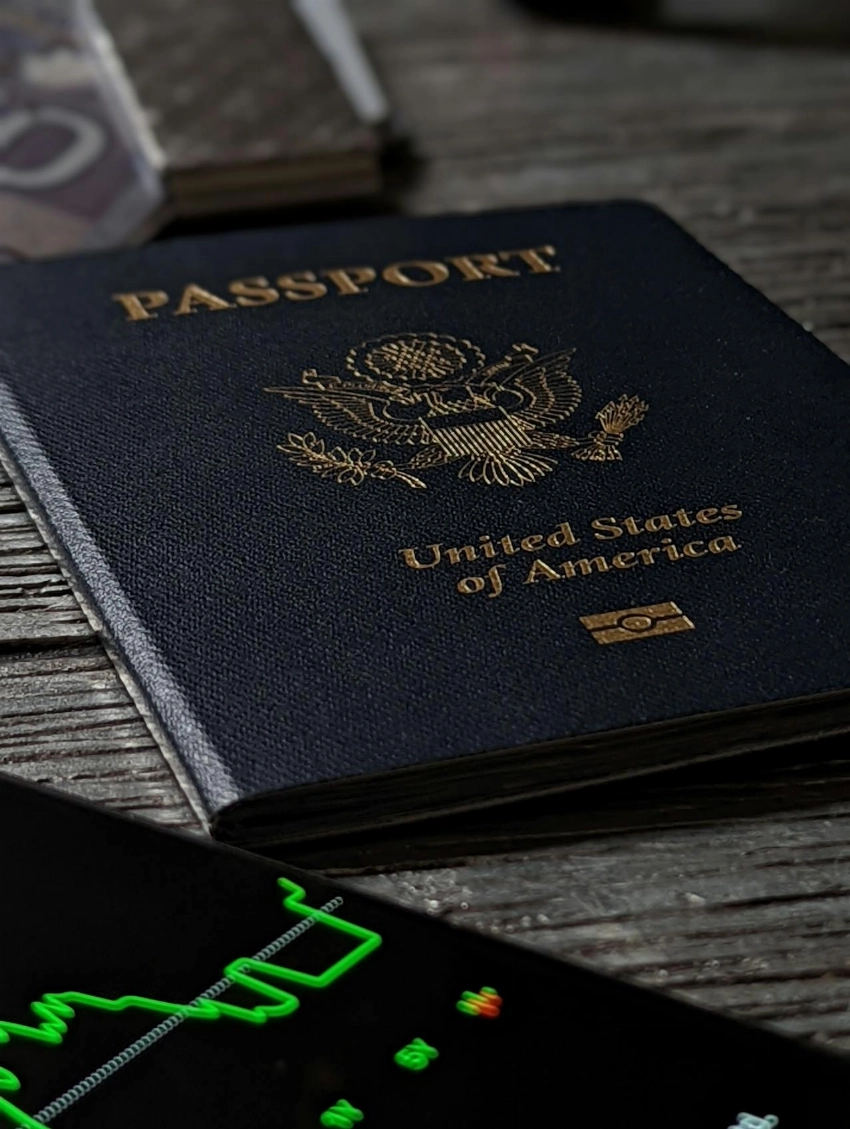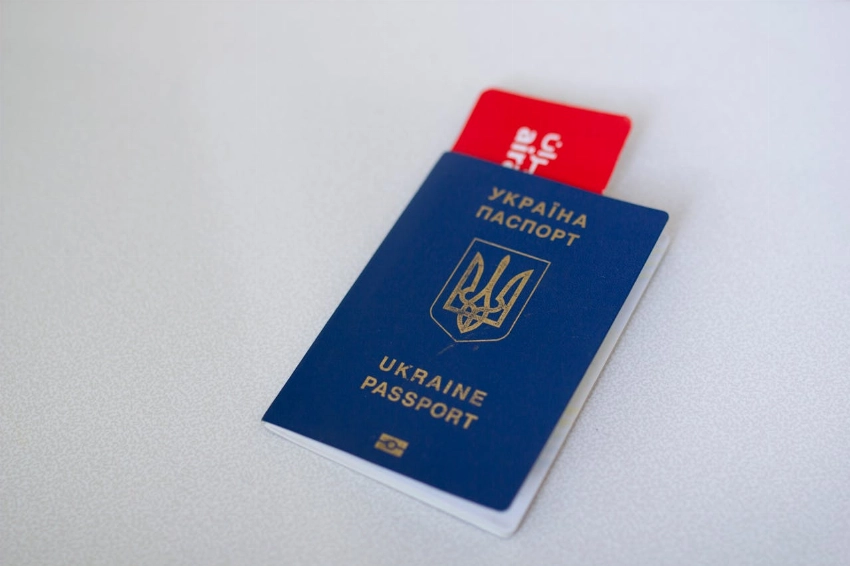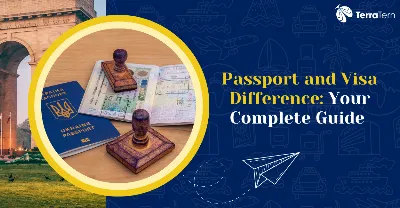Key Highlights
- Passport and Visa Difference
- What is a Passport? Understanding Your Identity Document
- What is a Visa? Your Entry Permission Explained
- Do I Need a Visa if I Have a Passport?
- Passport and Visa Differences
- Practical Travel Scenarios: When You Need Both Documents?
- Tourist Travel Documentation
- Common Mistakes to Avoid
- Expert Tips for Smooth International Travel
- Latest Facts and News Section
- Conclusion
Do you get it wrong on the meaning of the passport and visa difference? Quite a lot of travellers (with more than 1.5 billion international trips made in a year) experience difficulty comprehending the passport and visa difference. Although these two are necessary travel documents, they have different uses, but are most frequently used together. Through the number descriptions, functions, and the way they affect the journey in 2025, we will unpack the meaning and purpose of each one of them in this detailed guide. Before embarking on a journey, whether to a foreign country for business or leisure, it is beneficial to understand the purpose of each document, thereby avoiding potential difficulties at the border. This guide will help you figure out the passport and visa difference, do I need a visa if I have a passport, and more!
Passport and Visa Difference

A passport is one of the personal identification documents that is issued by your country of citizenship. A visa is, however, the permission granted to you by a foreign nation to visit their country, to stay there, or even to pass through their border.
|
Feature |
Passport |
Visa |
|
Issued By |
Your national country |
Destination country |
|
Purpose |
Proof of Identity and citizenship |
Entry permission |
|
Validity Period |
5 years to 10 years |
Age: days to years |
|
Application Location |
National passport office |
Destination country embassy/consulate |
|
Requirements To Travel |
Yes |
It depends on where it is going. |
Also Read: Top 10 Visa Rejected Reasons: Know Latest Changes
What is a Passport? Understanding Your Identity Document
A passport is a government document issued to certify the identity and nationality of a person who is authorised to travel and sometimes to work. It is binding in international travel because it is the most significant way of checking identities at international borders. The definition of a passport is an essential component in learning more about the passport and visa difference.
International flights cannot be boarded without a valid passport, and neither can a visa be obtained nor entry be made into foreign countries without one. In the absence of a passport, most travellers cannot be legally permitted to enter or exit a country. A passport is an instrument in the form of an official document issued by a government that serves as evidence of identity and nationality. A passport is used by the holder to travel in and out of countries.
Key Components of a Passport
Modern passports have several pages and excellent security features that ensure identity theft and fraud are not possible. It is essential to know more about these parts when using or renewing a passport.
These would include some of the most important aspects of a passport, such as:
-
Biographical Page: This is your full name, your date of birth, your nationality, your passport number, and a photo.
-
Verifies Signature Field: Verifies whether the holder is fake or not.
-
Machine-Readable Zone (MRZ): It makes fast scanning of the document possible at the immigration checkpoints.
-
Security Features: The documents possess micro printing, holograms, UV characteristics, embedded chip (in e-passports), and watermarks against forgery.
-
Blank Pages: The pages without any borders, which are used to put stamps of visas and those of entering and leaving the country.
Types of Passports Available
A passport may be of different types based on the purpose of travel and the status of the holder. The passports have individual characteristics and qualifications.
|
Kind of passport |
The right to apply |
Application |
Period of validity |
|
Ordinary Passport |
The general people |
The normal international travel |
5 or 10 years |
|
Diplomatic passport |
Government diplomats |
A diploma is awarded for international diplomacy missions. |
for 5 years (typically) |
|
official passport |
The employees of the government |
The official work of the government |
situation-specific, |
|
Emergency Passport |
People in an emergency in a foreign country |
Urgent re-entry in case of loss of passport |
No more than 1 year long |
What is a Visa? Your Entry Permission Explained

A visa is a stamp or an official permit granted by the government of a country that the traveller is visiting, enabling the traveller to enter, remain, or pass through its territory, based on a specific purpose of travel and a limited time frame. As opposed to a passport, which is an identity and citizenship document, a visa is an authorisation that is issued by a destination country. It is normally stamped, pasted, or connected electronically to the passport of the traveller in question.
This question, which asks, Do I need a visa if I have a passport, gets many travellers puzzled. The answer is: Yes, more often than not. Having a passport does not automatically give one the right to enter another country. Visa policies of a given country assist in entry permissions, and these policies differ based on the nationality of the traveller, destination, and purpose of travel.
Common Visa Categories and Their Purposes
Governments provide several different visas depending on the motivation of the journey, time, duration of the stay, and the journeyer's legal intent. The knowledge of typical visa categories will allow you to establish the right one and prevent denial of entry into the country.
In this saga of passport and visa difference, the most used types of visas are broken down below:
|
Visa Type |
Pupose |
Typical |
Requirements |
|
Tourist visa |
To spend a vacation, for entertainment, or to visit family or friends |
30-90 days (varies) |
Confirmation of the residence place of stay, the ticket back, and the financial support |
|
Business Visa |
To participate in meetings, conferences, or business deals |
30-180 days |
An invitation letter from the host company, a questionnaire on financial status, and the aim of the visit |
|
Student Visa |
To pursue studies in an academic field in another country |
Time frame of the course of study |
: Application letter, financial status, language proficiency ( country of destination) |
|
Work Visa |
To work or carry out professional agreements in a foreign land |
1-5 years (renewable) |
The work permission, the job contract, the assessment of skills or expertise |
|
Transit Visa |
To pass through one country to another country |
2496 hours |
The document that permits you to pass further, the visa to the second country (when required) |
1. Tourist Visa
-
Recreational, sightseeing, and short-term visit
-
It does not have the right to work or to pursue prolonged studies
-
Also, to be acquired at borders or in the form of an eVisa
2. Business Visa
-
Speaking about agreements, meetings, and business life
-
Commercial enterprise, A limit on salary employment
-
You should have immigration letters and financial evidence
3. Student Visa
-
Committed to a university/approved institution of learning
-
Limitations: He/she has to be a full-time student
-
Other Notes: Some countries permit part-time employment during studies
4. Work Visa
-
Purpose: The goal of working in a company or an organisation in a foreign country
-
Restrictions: You are tied to an employer and usually need sponsorship
-
The consequence of this may be a residency in some countries (e.g., H-1B in the U.S.)
5. Transit Visa
-
Short-term visit to the airports or countries in transit
-
Restrictions: It is not possible to leave the airport in some instances
-
It is not mandatory for all countries to allow transit flights
Also Read: GEP Full Form in Passport: Complete Experts Guide
Do I Need a Visa if I Have a Passport?
Just because you have the passport, it does not imply that whatever country you go to, you enter freely. In this case, you already have a passport as your main document to travel abroad, but some countries might also require you to have a visa, depending on the country that you are traveling to and the purpose and intention behind your journey, as well as your nationality. In simple words, Do I need a visa if I have a passport is a common question because visa policies vary widely across countries. There exist visa-free travel agreement between many countries and others where the citizens of the partner countries can enter a country without having to apply a short term visa. An example is the fact that U.S citizens are allowed to visit most EU countries where they spend up to 90 days without a Visa. But in case you happen to be an Indian, even staying there in those countries during short trips can require you to have a visa.
Electronic travel authorizations (ETAs), also known as visa-on-arrival, can be found in some cases. As an example, any travelers originating in some countries can receive a visa on arrival once they enter Thailand. Nevertheless, it is under these particular entry considerations that the question, do I need a visa if i have a passport, is answered.
Also needed are visa requirements. Other countries, such as China and Russia, usually require all foreigners to get a visa before traveling, even if they have a valid passport. The fact that your passport is strong (the Japanese or Singaporean passports are good examples) does not release it of the necessity of getting a visa to every region.
To elaborate on the question, do I need a visa if I have a passport? Think of practical experience and such tools as the IATA Travel Centre, or the immigration site of the country you are going to. These will assist you in ensuring you possess a visa depending on the type of passport you possess, your nationality, and the purpose of traveling.
Visa-Free Travel Destinations
There are also visa waiver arrangements between some countries enabling citizens of some countries to enter such countries without a visa, to enter on a tourist or business or short-term basis. The main facts about visa-free travel should be as follows:
When your country allows visa-free travel, you can travel to another country by only carrying your passport, and there is no application.
The length of visa-free is normally 14 to 180 days, either under bilateral agreements or multilateral agreements.
Some examples of Visa-Free Access are:
|
Passport holder |
Visa-Free Destinations |
Max stay duration |
|
USA citizens |
180 countries (i.e., Japan, UK, Mexico) |
30180 days |
|
EU Citizens |
USA (through ESTA), Canada, and the majority of Asia |
90180 days |
|
Singaporeans |
have one of the most powerful passports in the world |
180 days or up to 90 days |
|
Indian Citizens |
Bhutan, Nepal, Maldives (visa-free or VOA ) |
30-90 days |
|
Nigerian Citizens |
Countries in the ECOWAS in West Africa |
90 days |
Fact (2025), Visa-free travel:
-
Japanese, Singaporean, and German passports are the most powerful in 2025 in regard to visa-free travel as per the Henley Passport Index.
-
Visa-on-Arrival (VOA) countries
-
You need a visa on entry (not usually free). Examples:
-
Thailand (30-day VOA tourism)
-
Egypt (30-day VOA, @25)
-
Kenya (eVisa VOA 90 days)
-
There are also visa waiver arrangements between some countries, enabling citizens of some countries to enter such countries without a visa, to enter on a tourist, business, or short-term basis.
When are Visas Mandatory?
Visas are mandatory when:
1. More than three months' stay ( Long-term stays)
-
USA - This can be done by ESTA (Electronic System for Travel Authorisation), which gives a maximum of 90 days; however, a B1/B2 visa is required in case of a prolonged stay.
-
Schengen Area 90 days within the 180-day rule, after which you should possess a continuous stay visa.
2. Business, Study or Business Travel
-
Work Visa- This is in cases where work is performed (e.g., USA H-1B, UK Skilled Worker Visa).
-
Student Visa is not required to study (e.g., Canada Study Permit, Australia Student Visa).
-
Business Visa: It is required for business trips, even on shorter visits (e.g., China M Visa).
3. Strict Visa Policy Countries
There are countries to which a visa is always necessary, no matter how strong the passport:
-
China (exceptions to transit)
-
Russia ( visa needed)
-
Saudi Arabia (tourism eVisas as of 2019)
4. Special Cases of Transit Visas
There is a possibility to spend a layover there; in that case, you should have a transit visa:
-
UK- Alien airports need to cross-function at airports, and this is necessary when changing airports.
-
USA - A transit passenger will also need the ESTA or C-1 visa.
Passport and Visa Differences
https://www.pexels.com/photo/human-hand-in-glove-holding-passport-4142915/
At the time of booking international travel, it is pertinent to recognise the passport and visa differences. Although both are necessary travel documents, they are used differently, issued under different conditions. We analyse the main peculiarities of all those differences, such as the issuing authorities, the validity periods, the application processes, and the usage rules below.
In this part, the passport and visa difference is simplified by giving a detailed comparison.
|
Aspect |
Passport |
Visa |
|
Function |
Determines and confirms He/She is national (nationally) |
Legalise a visit to another nation |
|
Issued By |
Home government |
International embassy/consulate |
|
Required For |
International travel of all types |
With regards to the destination/purpose |
|
Validity |
5–10 years |
A few days to years |
|
Application |
Passport office |
The embassy of the Destination or online |
|
Renewal Requirement |
Before expiry |
Depending on the type of visas |
Issuing Authorities and Application Processes
The issuing authorities, in the case of issuing travel documents, are important to know:
-
Document Who to get it from Where to get it
-
Passport: The government, whose country of residence you are in ( e.g., U.S. Department of State, Passport Seva in India), Home passport offices, or web-based portals
-
Visit the foreign country consulate where you are going or the official eVisa websites. The government of the foreign country you are going to.
Passport Application: Step-by-Step Process
The passport application step-by-step process is:
1. Check Eligibility
-
The new enrollees will have to provide documentation in the form of birth certificates.
-
The old passports are needed to make renewals.
2. Gather Documents
-
Birth/naturalisation certificates (citizenship certificates)
-
Driving license (Driving license, identity card)
-
(No Flexible size/ background) Passports
3. Submit Application
-
Internet (most countries )
-
In passport offices (face-to-face to give biometrics)
4. Pay Fees
-
Fast track: 150 - 400 dollars (2- 3 months)
-
Rush: I now have on top of all that 2-3 more weeks and 60 -200 dollars
5. Track & Receive
-
Pick-up (physical Pick-up or mailing Pick-up)
-
As of today, most countries have made it possible to renew the passport online* provided your old passport is not more than 5-15 years old.
Visa Application Step-by-Step Process
The step-by-step process for visa application is:
1. Check Visa Requirements
-
Use governmental websites with decentralised (not third-party)
-
The time of checking (some will require hundreds of months)
2. Complete Full Application Form
-
Electronic (eVisas) or paper-based
-
This should be precise-there should be no errors, or it will be rejected
3. Supporting Documentation in Writing
-
Tourist Visa: Bank accounts, Hotel bookings, airline Tickets
-
Work Visa: job contract; letters of undertaking from the company
-
Student Visa: Admission letter to the university, and fees at the University.
4. Schedule Appointment
-
It has different wait times (i.e., U.S visas: 30-180 days)
-
Inscribed on the passport, on the PDF eVisa, or on the electronic ticket
5 Pay Fees and Submit
-
The visa fees vary between 20 dollars (tourist) and a few hundred dollars (work)
-
There are countries where a reciprocity fee is imposed
6. Receive Visa
-
The passport, eVisa PDF, or electronic connection will have an embossing.
Validity Periods and Renewal Requirements
Validity of a passport vs a visa: Compared/documents:
|
Document Standard |
Validity Minimum |
Validity Required to Travel |
Renewal Process |
|
Passport |
5-10 years, |
Six months after the trip date |
Reapplication of a passport with a new photo |
|
Tourist Visa |
1 month - 10 years |
During the whole duration of the visit |
A new application is required |
|
Work Visa |
1-5 years |
Needs to be the same as the original employment contract. |
Can be renewed within the nation |
|
Student Visa |
The period of study |
has to match the academic program |
Might be required to have evidence of study |
Passport Renewal Necessities
When to renew?
-
A minimum of 9-12 months before expiry (most airlines do not permit boarding when there is <6 months remaining)
-
Once all the visa pages are full (visa pages tend to have business travellers, especially)
Renewal Steps
-
Ensure your nation does not prohibit online renewal
-
Submit the latest passport
-
Change all personal statistics that are modified (gender, name)
-
Renewal of paying fees (they are sometimes cheaper than the first applications)
Rules of Visa renewal/extension
Tourist Visas:
-
The rare kind is extendable to (have to leave and reapply)
-
COVID-era policies in certain countries
Student and Work visas
-
Renewable in far-sighted cases when status is held
-
Re-verificazione (prenotazione, diplomi attinenza, famiglia).
E-Visas
-
Others have the freedom of extension online (e.g., Dubai tourist visas)
-
Some are to pulse applications, whereas others require complete reapplication
Processing Times Comparison
|
Document Processing |
Standard Processing |
Expedited Option |
|
Paper-to-paper Visa Processing |
4 8 weeks |
2 3 weeks ($60+) |
|
Renewal of Visa |
1 week 3 months |
This depends on the country |
Requests to extend the term of the visa:
-
30-60 days before expiry (the working/students field)
-
Before the expiry of the present visa (extension of tourist visas may not always be possible)
Also Read: Oman Visa on Arrival for Indian Passport Holders
Practical Travel Scenarios: When You Need Both Documents?
The system of documents for international travel is balky. We list below the factors to consider in real life when you should and should not require a passport alone, and when you do require both a passport and visa difference with examples of what to do and what to avoid when travelling on business and pleasure.
Business Travel Requirements
A passport and a Visa are needed by Business travellers:
1. Meetings/Client Meeting
The thing is that we required a passport and a Business Visa
Must Provide:
-
The welcome letter to sign that will be issued by the host company
-
Records of registration for the conference
-
Business banks' quarterly reports
2. Short-Term Work Assignments (<90 days)
When doing long projects or even when the projects are short, the requirement is a Work Permit + Business Visa
Policy Dictatorial States
-
B1 visa, USA
-
spaced-out visas, or a multiple-entry visa
-
Business Visit Visa Saudi Arabia (Business Visit Visa)
3. Cross-border Business Travelling
Business Visa Business Visa (PDF)
Schengen Business Visa is an application that covers 26 European countries in one go.
On the one hand, there are the examples of Visa-Free Locations (year 2025):
Tourist Travel Documentation
-
When all that the Tourists need is a Passport
-
Indians: the Maldives, Bhutan, Nepal
1. Countries in which the EU Citizens may work nationally: over 50 nations (Brazil/Japan)
-
Thailand: (1month, app. 40 dollar price)
-
Egypt: ( 30 days, 25USD at the airport)
2. Long-Stay Tourists (90days+)
-
Tourists will have to be in Possession of a Passport and a Visa Where
-
Duration of tourism more than 90 days:s Long-term (more than 90 days) tourism
-
In Places that Tourists Need a Passport and a Visa
-
Long-term (more than 90 days) tourism
Common Mistakes to Avoid

Stay away from such mistakes:
-
Assuming that all you need is a passport
-
Violation of visa conditions
-
Applying to get a visa late
-
Forgotten expiration date of documents
-
Wrong use of a visa type: The intended use of a visa
Expert Tips for Smooth International Travel
-
Make a Passport and Visa Application: This is best done 2-3 months before travelling
-
Backup Copies: Take back up computer and hard copies of your documents
-
Be in the Know: Government websites keep you informed about the entry laws
-
Monitor Validity: Different nations have a 6-month validity period for the passports
-
Preparation for Emergencies: Find out the location of your nearest embassy
Also Read: Malaysia Visa on Arrival for Indians: Latest Guide & Fees
Latest Facts and News Section
-
Digital Transformation: In 2025, over 60% of countries now offer electronic visa applications, streamlining the traditional passport-visa requirement process.
-
Post-Pandemic Changes: Visa requirements have become more stringent, with many countries implementing additional health documentation alongside traditional passport and visa requirements.
-
Biometric Integration: The latest biometric passports contain enhanced security features that work seamlessly with new visa processing systems in 2025.
-
Visa-Free Travel Expansion: Singapore passport holders can now access 195 destinations without a visa, demonstrating the evolving relationship between passport strength and visa requirements.
-
Digital Nomad Visas: New visa categories for remote workers have emerged, requiring specific documentation beyond traditional passport requirements
Conclusion
In 2025, international travellers need to be aware of the issue of passport and visa differences. Although the passport identifies your identity and nationality, a visa provides the right to gain access to particular countries under set terms. This is because you should always conduct research about the entry requirements of the place that you are going, and this is because: getting the right documents will translate to the passport and visa difference, a smooth journey, and a bounced boarding once you have got that documentation right. Safe travels!
To stay updated with the latest guidelines for passports and to find assistance for immigrating to any country of your choice, contact TerraTern right away!






